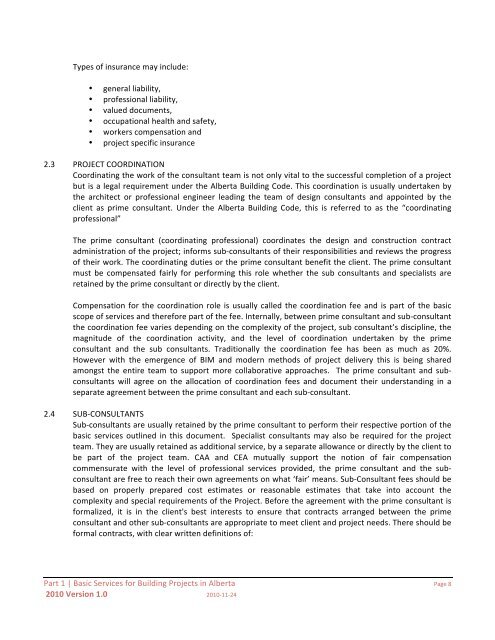Scope of Services - Consulting Architects of Alberta
Scope of Services - Consulting Architects of Alberta
Scope of Services - Consulting Architects of Alberta
Create successful ePaper yourself
Turn your PDF publications into a flip-book with our unique Google optimized e-Paper software.
<br />
<br />
<br />
<br />
Types <strong>of</strong> insurance may include: <br />
<br />
• general liability, <br />
• pr<strong>of</strong>essional liability, <br />
• valued documents, <br />
• occupational health and safety, <br />
• workers compensation and <br />
• project specific insurance <br />
2.3 PROJECT COORDINATION <br />
Coordinating the work <strong>of</strong> the consultant team is not only vital to the successful completion <strong>of</strong> a project <br />
but is a legal requirement under the <strong>Alberta</strong> Building Code. This coordination is usually undertaken by <br />
the architect or pr<strong>of</strong>essional engineer leading the team <strong>of</strong> design consultants and appointed by the <br />
client as prime consultant. Under the <strong>Alberta</strong> Building Code, this is referred to as the “coordinating <br />
pr<strong>of</strong>essional” <br />
<br />
The prime consultant (coordinating pr<strong>of</strong>essional) coordinates the design and construction contract <br />
administration <strong>of</strong> the project; informs sub‐consultants <strong>of</strong> their responsibilities and reviews the progress <br />
<strong>of</strong> their work. The coordinating duties or the prime consultant benefit the client. The prime consultant <br />
must be compensated fairly for performing this role whether the sub consultants and specialists are <br />
retained by the prime consultant or directly by the client. <br />
<br />
Compensation for the coordination role is usually called the coordination fee and is part <strong>of</strong> the basic <br />
scope <strong>of</strong> services and therefore part <strong>of</strong> the fee. Internally, between prime consultant and sub‐consultant <br />
the coordination fee varies depending on the complexity <strong>of</strong> the project, sub consultant’s discipline, the <br />
magnitude <strong>of</strong> the coordination activity, and the level <strong>of</strong> coordination undertaken by the prime <br />
consultant and the sub consultants. Traditionally the coordination fee has been as much as 20%. <br />
However with the emergence <strong>of</strong> BIM and modern methods <strong>of</strong> project delivery this is being shared <br />
amongst the entire team to support more collaborative approaches. The prime consultant and sub‐<br />
consultants will agree on the allocation <strong>of</strong> coordination fees and document their understanding in a <br />
separate agreement between the prime consultant and each sub‐consultant. <br />
<br />
2.4 SUB‐CONSULTANTS <br />
Sub‐consultants are usually retained by the prime consultant to perform their respective portion <strong>of</strong> the <br />
basic services outlined in this document. Specialist consultants may also be required for the project <br />
team. They are usually retained as additional service, by a separate allowance or directly by the client to <br />
be part <strong>of</strong> the project team. CAA and CEA mutually support the notion <strong>of</strong> fair compensation <br />
commensurate with the level <strong>of</strong> pr<strong>of</strong>essional services provided, the prime consultant and the sub‐<br />
consultant are free to reach their own agreements on what ‘fair’ means. Sub‐Consultant fees should be <br />
based on properly prepared cost estimates or reasonable estimates that take into account the <br />
complexity and special requirements <strong>of</strong> the Project. Before the agreement with the prime consultant is <br />
formalized, it is in the client's best interests to ensure that contracts arranged between the prime <br />
consultant and other sub‐consultants are appropriate to meet client and project needs. There should be <br />
formal contracts, with clear written definitions <strong>of</strong>: <br />
<br />
<br />
<br />
Part 1 | Basic <strong>Services</strong> for Building Projects in <strong>Alberta</strong> Page 8 <br />
2010 Version 1.0 2010‐11‐24


